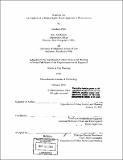Water for all : an analysis of a human rights based approach to water access
Author(s)
Patel, Darshana (Darshana Dinubhai), 1972-
DownloadFull printable version (4.041Mb)
Alternative title
Human rights based approach to water access
Other Contributors
Massachusetts Institute of Technology. Dept. of Urban Studies and Planning.
Advisor
Balakrishnan Rajagopal.
Terms of use
Metadata
Show full item recordAbstract
An interdisciplinary and qualitative study was undertaken to determine whether a human rights based approach would ensure each person's access to a water supply sufficient to meet her basic needs. A human right to water shows promise as a strategy for ensuring universal access to water if a broad, comprehensive human rights theory is ascribed to. In a coherent, comprehensive human rights theory, human rights are interdependent and indivisible from other human rights and are predicated upon a core unifying principle such as justice or human dignity for all. The language of many human rights documents indicates that a coherent, comprehensive human rights system was envisioned, but the practices and actions of many countries over the past fifty years indicate that this vision is strongly resisted. Absent such a comprehensive theory of human rights, a human right to water can have great impact as a moral and ethical justification that planners and policy-makers can use to implement programs that increase access to water. A human right to water can also increase participation in a dialogue about water management. This discussion concerning water management must be undertaken soon since a water crisis is looming and water wars are predicted.
Description
Thesis (M.C.P.)--Massachusetts Institute of Technology, Dept. of Urban Studies and Planning, 2001. Includes bibliographical references (p. 75-80).
Date issued
2001Department
Massachusetts Institute of Technology. Department of Urban Studies and PlanningPublisher
Massachusetts Institute of Technology
Keywords
Urban Studies and Planning.